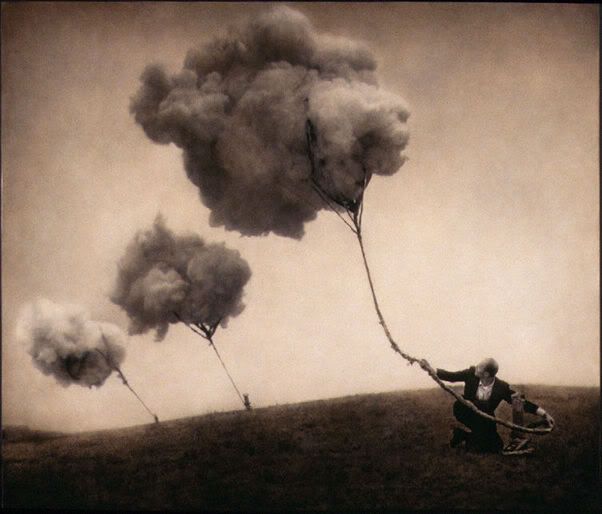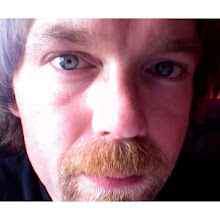Divine lightning reaction?
A Chinese man who swore to God that he didn’t owe money to a neighbour was hit by lightning a minute later. The man, named Xu, made the oath in front of a crowd of neighbours in Fuqing city, reports Southeast Express. He vowed that he had never borrowed money from Mr Huang, who claimed Xu borrowed 500 yuan, the equivalent of £40, from him three years earlier. “He borrowed 500 yuan three years ago from me for a friend’s marriage gift, but he has denied it ever since then,” said Huang, who went to Xu’s home to demand payment. “I told him that if he dared to swear to God that he didn’t owe me the money, then I would waive his debt,” said Huang. Xu made the oath, but was suddenly struck by lightning a minute later. He was immediately taken to hospital where doctors confirmed he had been hit by lightning. He is expected to make a full recovery.
Monday, September 1, 2008
Wednesday, August 6, 2008
Set Design in Cirrus: The Importance of an Open Air Theater in the Works of Shakespeare
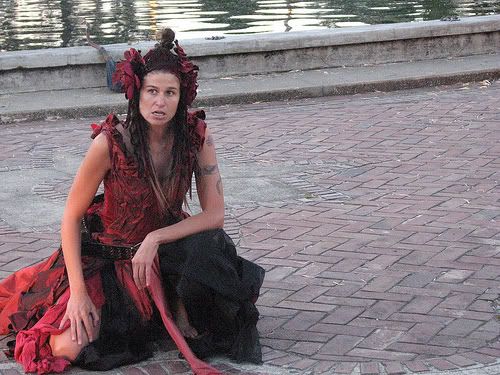
These are the forgeries of jealousy:
And never, since the middle summer's spring,
Met we on hill, in dale, forest or mead,
By paved fountain or by rushy brook,
Or in the beached margent of the sea,
To dance our ringlets to the whistling wind,
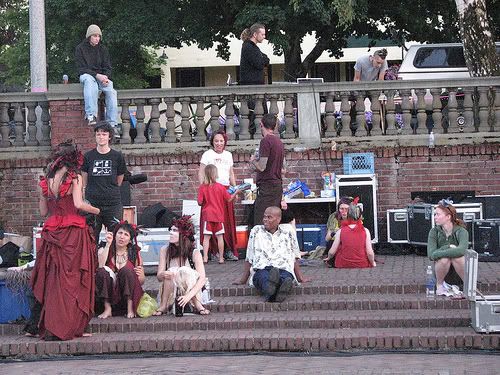
But with thy brawls thou hast disturb'd our sport.
Therefore the winds, piping to us in vain,
As in revenge, have suck'd up from the sea
Contagious fogs; which falling in the land
Have every pelting river made so proud
That they have overborne their continents:
The ox hath therefore stretch'd his yoke in vain,
The ploughman lost his sweat, and the green corn
Hath rotted ere his youth attain'd a beard;
The fold stands empty in the drowned field,
And crows are fatted with the murrion flock;
The nine men's morris is fill'd up with mud,
And the quaint mazes in the wanton green
For lack of tread are undistinguishable:
The human mortals want their winter here;
No night is now with hymn or carol blest:
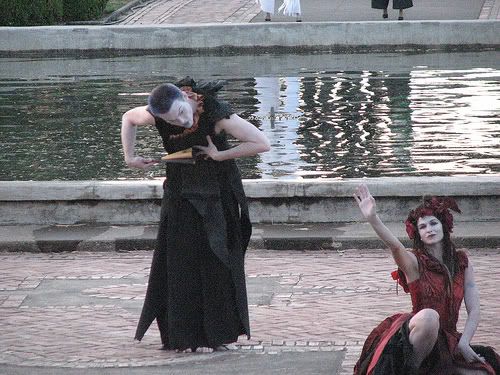
Therefore the moon, the governess of floods,
Pale in her anger, washes all the air,
That rheumatic diseases do abound:
And thorough this distemperature we see
The seasons alter: hoary-headed frosts
Far in the fresh lap of the crimson rose,
And on old Hiems' thin and icy crown
An odorous chaplet of sweet summer buds
Is, as in mockery, set: the spring, the summer,
The childing autumn, angry winter, change
Their wonted liveries, and the mazed world,
By their increase, now knows not which is which:
And this same progeny of evils comes
From our debate, from our dissension;
We are their parents and original.
Midsummer Night's Dream, Act 2, Scene 1
Possible Shakespearean theater found in London
By JENNIFER QUINN, Associated Press
LONDON - The theater where "The Merchant of Venice" and "Romeo and Juliet" likely debuted and where William Shakespeare himself may have trodden the boards has likely been discovered in east London, archaeologists at the Museum of London said Wednesday.
The possible foundations of what is known as simply, The Theatre, were unearthed by builders excavating the site — a vacant garage — for another structure. Museum archaeologists were called to the location to make sure nothing was destroyed, and had a eureka moment.
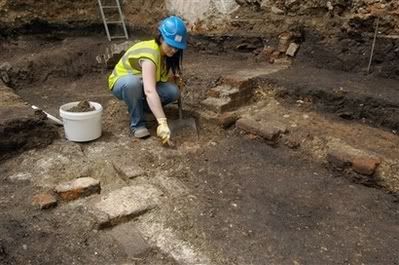
"We were there, scratching our heads, looking into the trenches, thinking, 'this could be it,'" said Jo Lyon, a senior archaeologist at the museum. "So we did some more research, and then we found the angled walls. And we all went, 'Oh my gosh, this should be it.' "
Other theaters of similar vintage also have angled walls, so the discovery was significant. Archaeologists had known for a long time there was a high probability for The Theatre to be on this particular site. But there are no maps that show its location, no images to show what it might have looked like, and only a vague description of it.
"It's in the right place, it's at the right angle to be a polygonal shape," Lyon said. "It's a pretty high possibility."
The possible discovery of The Theatre, built in 1576 and where Shakespeare's troupe performed in the 1590s, could complete the set of open-air theaters where the Bard's plays were staged. The Rose theater's location was discovered in 1989 in Bankside, just south of the River Thames in central London, and the Globe theater is nearby. A replica of the Globe was built on a site close to the original and opened in 1997.
Shakespeare's company, the Lord Chamberlain's Men, only moved into The Theatre in the 1590s. Until then, they had been performing at the Rose, but a shake up in the London theater scene necessitated the move, said Martin Wiggins, a fellow at the Shakespeare Institute at the University of Birmingham.
And in 1597, a dispute with the landlord forced the company to move again, Wiggins said. The company didn't own the ground The Theatre was built on, but Lord Chamberlain's Men did own the material it was built with, so they simply dismantled the entire theater and moved it south across the River Thames, where it was rebuilt and renamed the Globe.
But The Theatre's foundations remained in east London, and that's what archaeologists believe they have found.
"The first thing I want to know about it is what the foundations can tell us about the architecture," Wiggins said. "How big was it? How does it compare with the Rose? How does it compare with the Globe? How similar are they?"
Wiggins said an understanding of what the theater looked like could help Shakespearean scholars understand more about this period in the playwright's history.
"The size of the theater will have an impact on the way the play is written," he said.
Other works that would have been performed during the period Shakespeare's company was at The Theatre would have included "Henry IV," "Richard II," "King John," and "the Merry Wives of Windsor," Wiggins said.
Lyon said it's unlikely The Theatre's complete foundations will ever be fully excavated, but her team intends to examine them further. Fittingly, a new theater is being built on the site, ensuring the foundations below are protected.
Saturday, July 26, 2008
Tornado in downtown Atlanta for the first time on record, March 14th 2008 at 9:45pm
The Dalai Lama has an office in Atlanta, at Emory University since being offered a position there last Spring. March 14 of course, was the same day rioting broke out in Lhasa, the Tibetan capital.
Friday, July 25, 2008
"A Color of the Sky" by Tony Hoagland
Windy today and I feel less than brilliant,
driving over the hills from work.
There are the dark parts on the road
when you pass through clumps of wood
and the bright spots where you have a view of the ocean,
but that doesn’t make the road an allegory.
I should call Marie and apologize
for being so boring at dinner last night,
but can I really promise not to be that way again?
And anyway, I’d rather watch the trees, tossing
in what certainly looks like sexual arousal.
Otherwise it’s spring, and everything looks frail;
the sky is baby blue, and the just-unfurling leaves
are full of infant chlorophyll,
the very tint of inexperience.
Last summer’s song is making a comeback on the radio,
and on the highway overpass,
the only metaphysical vandal in America has written
MEMORY LOVES TIME
in big black spraypaint letters,
which makes us wonder if Time loves Memory back.
Last night I dreamed of X again.
She’s like a stain on my subconscious sheets.
Years ago she penetrated me
but though I scrubbed and scrubbed and scrubbed,
I never got her out,
but now I’m glad.
What I thought was an end turned out to be a middle.
What I thought was a brick wall turned out to be a tunnel.
What I thought was an injustice
turned out to be a color of the sky.
Outside the youth center, between the liquor store
and the police station,
a little dogwood tree is losing its mind;
overflowing with blossomfoam,
like a sudsy mug of beer;
like a bride ripping off her clothes,
dropping snow white petals to the ground in clouds,
so Nature’s wastefulness seems quietly obscene.
It’s been doing that all week:
making beauty,
and throwing it away,
and making more.
from What Narcissism Means to Me © 2003
driving over the hills from work.
There are the dark parts on the road
when you pass through clumps of wood
and the bright spots where you have a view of the ocean,
but that doesn’t make the road an allegory.
I should call Marie and apologize
for being so boring at dinner last night,
but can I really promise not to be that way again?
And anyway, I’d rather watch the trees, tossing
in what certainly looks like sexual arousal.
Otherwise it’s spring, and everything looks frail;
the sky is baby blue, and the just-unfurling leaves
are full of infant chlorophyll,
the very tint of inexperience.
Last summer’s song is making a comeback on the radio,
and on the highway overpass,
the only metaphysical vandal in America has written
MEMORY LOVES TIME
in big black spraypaint letters,
which makes us wonder if Time loves Memory back.
Last night I dreamed of X again.
She’s like a stain on my subconscious sheets.
Years ago she penetrated me
but though I scrubbed and scrubbed and scrubbed,
I never got her out,
but now I’m glad.
What I thought was an end turned out to be a middle.
What I thought was a brick wall turned out to be a tunnel.
What I thought was an injustice
turned out to be a color of the sky.
Outside the youth center, between the liquor store
and the police station,
a little dogwood tree is losing its mind;
overflowing with blossomfoam,
like a sudsy mug of beer;
like a bride ripping off her clothes,
dropping snow white petals to the ground in clouds,
so Nature’s wastefulness seems quietly obscene.
It’s been doing that all week:
making beauty,
and throwing it away,
and making more.
from What Narcissism Means to Me © 2003
Artist behind Beijing's 'bird's nest' stadium boycotts Olympics

The Chinese artist behind the stunning Olympic stadium in Beijing, nicknamed The Bird's Nest, has lambasted the 2008 Games and says he wants no part in promoting it.
"I would rather be disconnected or forgotten," Ai Weiwei told The Guardian newspaper.
The Chinese National Olympic Stadium, also known as the Bird's Nest, holds 91,000 people.The Chinese National Olympic Stadium, also known as the Bird's Nest, holds 91,000 people.

Ai, a prominent artist and designer living in Beijing, was hired by the Swiss firm Herzog & de Meuron to help create a design for the 91,000-seat stadium. The $400-million building has been hailed as an architectural wonder, with its ribbons of intersecting steel resembling a bird's nest.
The artist is incensed by the positive show the Chinese government is putting forth ahead of the games, set to open Aug. 8, 2008, ignoring its human rights record.
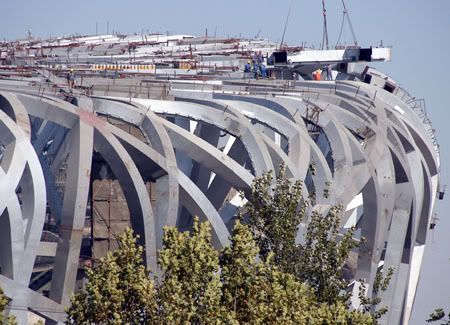
"I hate the kind of feeling stirred up by promotion or propaganda … It's the kind of sentiment when you don't stick to the facts, but try to make up something, to mislead people away from a true discussion."
Ai says he hates that the stadium has become a shining symbol of China's march towards modernism. He calls it a "pretend smile."
"I would feel ashamed if I just designed something for glamour or to show some kind of fake image."
Ai also had choice words for other artistic types participating in the hoopla — filmmakers Steven Spielberg and Zhang Yimou, a former classmate from their days at the Beijing Film Academy.
"It's disgusting. I don't like anyone who shamelessly abuses their profession, who makes no moral judgment."
Organizers announced last April that Spielberg and Yimou had been hired as artistic consultants for the opening and closing ceremonies.
Spielberg has indicated he would pull out if China opposed a measure to increase UN peacekeepers in Darfur. That proposition recently passed.
'I did it because I love design...'—Ai WeiWei

The director said he would like the ceremonies to "give the world a taste of peace, friendship and understanding."
While Ai castigates the Chinese government and those involved in the Olympics, the artist says he has no regrets designing the stadium.
"I did it because I love design and the idea of how it would be looked at by others."
The 50-year-old comes by his anti-authoritarianism honestly. He spent much of his childhood in a remote province where his father, Ai Qin, one of China's most respected modern poets, was exiled during the Communist era for being an enemy of the state.
"I spent five years with him at a labour camp where he cleaned toilets," he told the website Gamesbid.com
Five years ago, police shut down a show curated by Ai. It included self-mutilation, human corpses and body parts.
--------
 Saturday, August 11, 2007 | CBC Arts
Saturday, August 11, 2007 | CBC ArtsBeijing Olympics Mascots

The Fuwa (Chinese: 福娃; pinyin: Fúwá; literally "good-luck dolls" and can be known as "Friendlies"), are the mascots of the 2008 Summer Olympics in Beijing. The designs were created by Han Meilin, a famous Chinese artist. The designs were publicly announced by the National Society of Chinese Classic Literature Studies on November 11, 2005 at an event marking the 1000th day before the opening of the games.
Subscribe to:
Posts (Atom)
